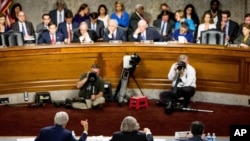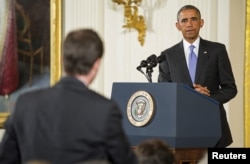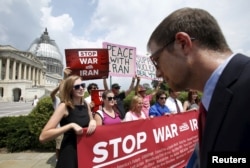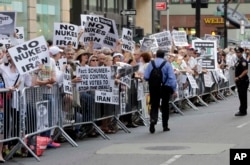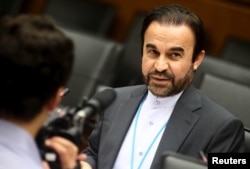U.S. President Barack Obama told groups who support the Iran nuclear deal to make their voices heard to Congress to counter the millions of dollars in lobbying by those who want to derail the agreement.
In a call Thursday with groups affiliated with the Center for American Progress, a left-leaning Washington think-tank, Obama said activists who want peace must not make the same mistake they did in the run-up to the Iraq war, when proponents of the war drowned out their weaker voices.
"Right now the opponents of this deal have been flooding Congressional offices," pouring $20 million into television ads and "putting the squeeze" on legislators to vote against the deal, he said, telling supporters they must work hard to counter an aggressive lobbying campaign against it.
Under pressure from powerful lobbies like the American Israel Public Affairs Committee, "they start getting squishy because they're feeling the political heat," Obama said.
The president, who has been aggressively courting Democrats, said legislators he's talked to say they want to vote for the deal, but cite the vigorous and loudly heard opposition, which has been beating a drumbeat against the agreement in virtually every social forum in the United States.
The July 14 agreement, reached between Iran and the U.S. plus five other world powers, calls on Tehran to curb its nuclear program in exchange for billions of dollars in sanctions relief.
However, opposition in the United States has been unexpectedly strong, with opponents of the deal questioning whether it goes far enough to ensure Iran does not develop a nuclear weapon.
Iraq War comparison
Obama said that many of the opponents are the same people who pushed the United States into war in Iraq in 2003.
"In the absence of your voices, you are going to see the same array of voices that got us into the Iraq war, leading to a situation in which we forgo a historic opportunity and we are back on the path of potential military conflict," he said.
Obama suggested the United States could be forced into a military confrontation with Iran within six months of backing out of the deal.
"The stakes could not be higher," he said.
If upheld, the deal is certain to shape Obama's legacy as he prepares to leave office, saying "I've never been more certain about a policy decision than I am here." Obama explained how the deal is designed to prevent Iran from acquiring the nuclear weapons he said it otherwise could develop within six months without the deal's constraints.
"But the politics here are going to be tough," he said. Not only are the vast majority of Republicans in Congress opposed and mobilizing to send him a resolution of disapproval in September, but support among Democrats has been slow to come.
Democratic support
Four Democrats voiced their support for the deal for the first time Thursday, including Chris Van Hollen of Maryland, a party leader in the House, and Michigan's Dan Kildee, who counts Amir Hekmati, a former U.S. Marine who is being held in Iran on espionage charges, as a constituent.
"It's very clear to me that the agreement is the best path forward," two-term Michigan Representative Kildee told The Associated Press in an interview. "This agreement allows us to prevent (Iran) from gaining a nuclear weapon, and if they cheat, we will know it. If we don't have the agreement, we don't have that certainty."
New Mexico Democratic Senator Tom Udall and North Carolina Representative David Price also announced their support for the agreement, a boost for Obama amid a week of furious lobbying and committee hearings on Capitol Hill.
But Obama needs the support of many more – at least one-third of the House and Senate – to uphold his veto, should the GOP as expected send him a resolution of disapproval.
Congress is currently reviewing the deal and has until September 17 to approve or reject the agreement.
Pro-Israel lobby
The pro-Israel lobby behind the multimillion-dollar ad campaign argues that Iran cannot be trusted – a contention that resonates with the public as opinion polls show most Americans do not trust Iran to keep its promises.
Calling Iran's government a "brutal" regime, Obama conceded that Iran might try to cheat.
But if it does, he said the deal gives the United States the leverage it needs to punish Iran harshly by sending its economy back into "depression."
"If they cheat, the sanctions will go back into place and their economy will go back into the tank," Obama said.
Every argument that's been made against the deal is either "inaccurate" or assumes the United States could have gotten a better deal by persuading Iran to forgo even peaceful development of nuclear power, he said.
"In the world of our dreams, that would be preferable," Obama said. "In the real world, this is a deal that gets the job done."
The White House did not provide a list of all the groups on Thursday's call.
Meanwhile, Reza Najafi, the chief Iranian delegate to the U.N.'s International Atomic Energy Agency, accused the U.S. of violating the nuclear deal with his country.
Najafi said Friday U.S. officials have made comments indicating that the accord, which foresees increased overview of Iran's nuclear activities by the IAEA, would make any attack on Tehran's atomic program more efficient because it would result in greater insight about potential targets.
He quoted White House spokesman Josh Earnest as saying the increased overview would result in enhanced U.S. or Israeli military action against Iran – if needed – "because we'd been spending the intervening number of years gathering significantly more detail about Iran's nuclear program."
'Military option'
Earnest, in his comments to reporters July 17, said the U.S. "military option would remain on the table" if Iran breaks the accord and races to make a bomb.
Najafi, in a July 24 letter posted to the IAEA website Wednesday, called Earnest's statement "outrageous."
He said it "seriously undermines the very basic principles" needed to implement the deal, adding that the comments amount to "a material breach of the commitments" agreed to by the U.S., Britain, China, Russia, France and Germany at the negotiating table with Iran.
RFE/RL contributed to this report. Some material for this report came from Reuters and AP.




